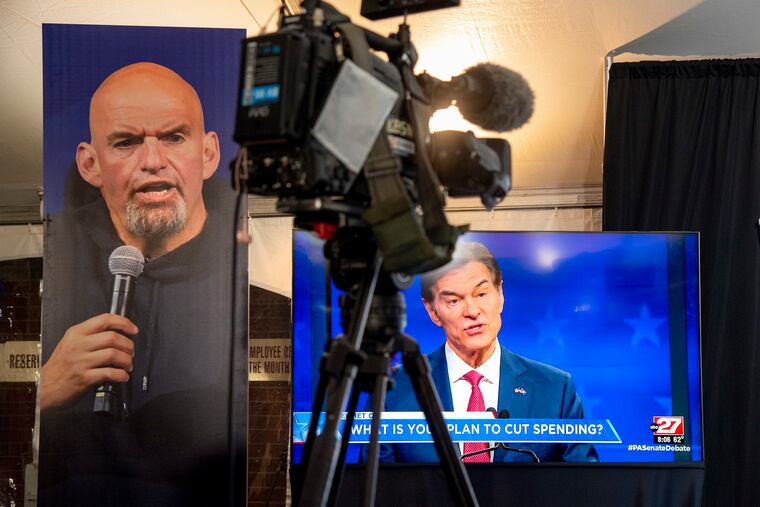Democrats’ midterm messaging is failing
When voters earn less money than they did last year, and housing is more expensive than ever, it's hard to get them to pay attention to other issues. Yet that's been Democrats' main strategy.

This is the point in the election cycle when it seems like every news story is about polls (and baseball, if you’re in Philadelphia). Besides a guess at who will win, polls can tell us which issues motivate people to vote. In those results, we can begin to see why Democrats’ messaging in the midterm campaign has fallen flat.
Voters elect a president and legislature, then two years later they punish them for not fixing everything. A president’s party gaining House seats in a midterm is pretty rare — it’s happened only twice since World War II. The Senate is flukier, since not every seat is up every year, but even there, the president’s party usually loses seats.
Incumbent Democrats would start with long odds, even if everything else was going fine for them. And everything else is not going fine. Mortgage rates are at a 20-year high. Inflation is at a 40-year high and wage growth has not kept pace.
Gallup released a report last month listing what Americans thought were the most important problems facing the country today. “The government/poor leadership” led the way with 22%. The next biggest were “high cost of living/inflation” at 17% and “the economy in general” at 12%. Nothing else reached double digits.
All of these are indictments of the party in power; if you think the government can fix these things, then you’ll probably blame them for not doing so.
When voters earn less money in real terms than they did last year, and housing is more expensive than ever, trying to get them to pay attention to other issues simply will not work.
Yet doing so has been Democrats’ leading strategy this year, as they’ve focused their messages on abortion and other social issues. True, they’re in a tough spot, as campaigning against the status quo is harder when you’re the incumbent party, and even Democrats’ traditional advantage as the so-called “party of education” has largely evaporated.
Campaigning against the status quo is harder when you’re the incumbent party.
After Dobbs, the Supreme Court decision overturning Roe v. Wade, abortion looked like a winning issue for Democrats. The results of a referendum in Kansas on the subject fed those hopes even more. But news cycles change quickly and abortion, which ranked as 8% of people’s top concern in the Gallup survey in July, has already receded to just 4%. And, it is worth noting, not everyone who is concerned about it favors abortion rights — thrusting abortion back into state legislatures means that antiabortion people have more reason to vote, too.
Dobbs also woke Republicans up to the fact that abortion had moved from a virtue-signaling issue to one that legislatures would now actually have to decide. Republicans have been quicker to moderate their views than Democrats — including Republican voters, only 11% of whom believe in a total ban on abortion, down from twice that number just two years ago.
» READ MORE: What the Fetterman-Oz debate means for abortion in Pennsylvania
While Mehmet’s Oz’s answer on abortion in last week’s senatorial debate was somewhat unclear, he did note that there should be exceptions, not a total ban. John Fetterman, on the other hand, refused to name any abortion he would not make legal, even saying that the government should pay for them and pay for women to travel here from states where abortion is less freely available. No wonder that voters overwhelmingly called a position like Fetterman’s “more extreme” than one like Oz’s in a poll this month.
The focus on the Jan. 6, 2021, riot at the Capitol has likewise failed to move the needle much toward Democrats, although the 4% who rate “democracy” as their top issue in the recent Gallup poll is an increase from almost no one doing so earlier in the year.
People in the political industry put a lot of stock into the idea that ads change voters’ minds. Maybe that is so, at times, but mostly through connecting a candidate to an issue the voters already care about. Commercials can’t make us ignore real problems.
Bill Clinton knew this in 1992 when he ran for president in a country just emerging from a recession. One of his campaign’s chief strategists, James Carville, famously summed up this idea in the phrase “It’s the economy, stupid.” Social issues motivate a few people, most of whom have already decided how they will vote. But the economy affects us all, especially those voters who don’t follow things as closely as the politicos and pundits.
If you’re being financially squeezed, voting based on other issues is a luxury good you likely can’t afford. This November, voters want someone to lower inflation, lower housing costs, and get the economy back on track. They may not be convinced Republicans can do it, but by now they know that Democrats can’t. All the slick messaging in the world can’t change that.